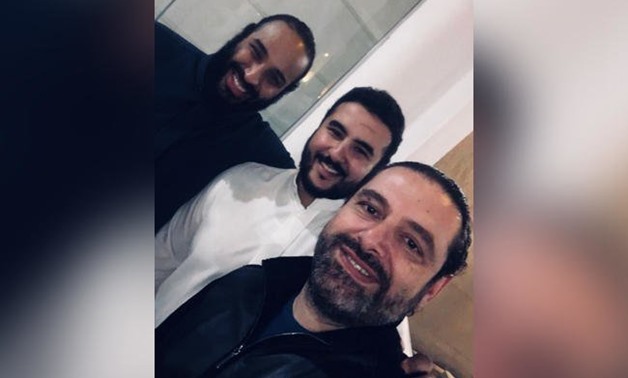
Selfie of Lebenese PM Saad Hariri, Saudi Crown Prince Mohammed bin Salman and Khaled bin Salman, Kingdom's ambassador to US - TWITTER/@saadhariri
CAIRO – 4 March 2018: What previous appeared to be a fragile relationship between Lebanon and Saudi Arabia is on the up once again. Lebanese Prime Minister Saad Hariri’s recent trip to the Kingdom signifies a break from what was a rocky and testing few months.
Hariri arrived on February 28 in the Kingdom of Saudi Arabia at the invitation of the royal family to review “the bilateral relations between the two countries and discuss developments in the region.” Hairi was received by Saudi King Salman at Al-Yamamah Palace in Riyadh and images showed smiles all round. During this latest visit, Hariri also met with Saudi Arabia's Crown Prince Mohammed bin Salman, marking their first meeting since Hariri resigned unexpectedly under pressure from the Prince.
A picture is worth a thousand words, and Hariri’s most recent trip to the Kingdom will be remembered through the selfie posted on Twitter on March 2. Dressed in casual attire and donning wide smiles, Hariri stands alongside Mohammed bin Salman and Khalid bin Salman, the Saudi ambassador to the United States. In stark contrast to the perception last October, the image portrays a revitalised relationship which has forgotten the troubles that shocked the region last year.
 This handout photo provided by the Saudi Royal Palace on Wednesday shows King Salman (right) receiving Lebanese Prime Minister Saad Hariri at the royal palace in the Saudi capital Riyadh - AFP
This handout photo provided by the Saudi Royal Palace on Wednesday shows King Salman (right) receiving Lebanese Prime Minister Saad Hariri at the royal palace in the Saudi capital Riyadh - AFP
Khalid bin Salman, a relatively unknown member of the Saudi royal family, has risen up the ranks quickly with the support of his older full brother Crown Prince Mohammed bin Salman. A former fighter pilot with the Saudi Royal Air Force, he flew missions against ISIS and over Yemen before he was made Ambassador to the U.S. in April 2017. As Mohamed bin Salman continues to consolidate power around youthful family members loyal to him, it is likely Khalid is being tested with his ambassadorial role to see where he can fit into the future king’s power base.
Hariri’s last trip to the Kingdom in 2017 led to one of the most bizarre political events of the year when he was denied contact from the outside world, confined to a Saudi palace and forced to read – under duress - from a pre-written script that issued his resignation as Prime Minister. The speech was broadcast live from Riyadh and cited fear of assassination, along with Hezbollah and Iran’s “unacceptable influence” over Lebanese politics.
His resignation, as it turns out, was short lived and after meeting just two weeks later with French President Emanuel Macron, Hariri suspended his resignation. Coming at a tense time in the Middle East when Iran has latched onto regional crises, including those in Syria and between Qatar and the Arab Quartet, is appears that the resignation was a publicity stunt to aggravate Iran’s opponents and its allied groups in the region. The relationship between the Hariri and al-Saud families has been prosperous for many decades.
The Crown Prince is pragmatic, progressive and ruthless; it appears seeds of change are blossoming in the Arabian Desert. Mohamed bin Salman has received warm support for the wave of reforms he has instigated in the deeply conservative country. Although there is a still a long way to go, MBS has set the country on an upward trajectory with his promises to provide equal opportunity to all citizens and to stamp out corruption; the recent corruption crackdown yielded $107 billion from those found culpable. In addition, the infamous ban on women driving will be lifted in 2018, just as the rule prohibiting women from attending public sporting events has been.
The Saudi “Vision 2030” outlines the path the country is set to follow in the coming decade, one in which leads to a “tolerant country with Islam as its constitution and moderation as its method”. The ambitious initiative will restructure the economy and diversify away from oil in an unprecedented shakeup of the Saudi economy.
It terms of foreign policy, MBS has instigated a ruthless campaign against Iranian-backed Houthi rebels in neighboring Yemen, and led the Arab Quartet in its boycott of Qatar.


Comments
Leave a Comment